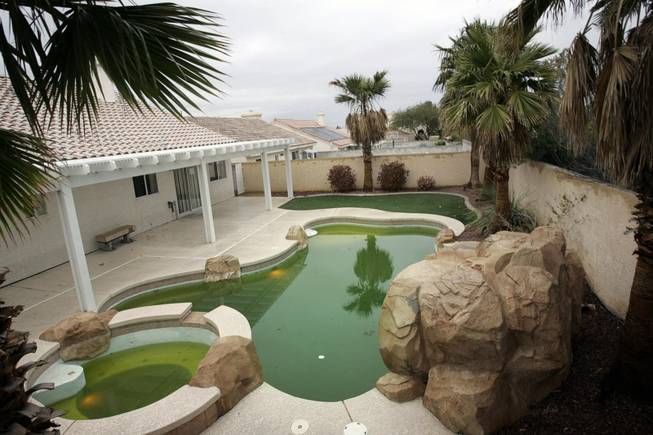
The unkempt pool of a bank-owned property is shown Jan. 27 in the Ventana Canyon neighborhood of Henderson. Fines for stagnant pools and other violations are becoming controversial.
Friday, Feb. 26, 2010 | 3 a.m.
With the foreclosure rate in Las Vegas leading the nation, investors have swooped in to take advantage of bargain home prices.
But their desire to make profits has, in some case, put them at odds with homeowners associations.
The battle appears to be intensifying after investment groups filed a class action lawsuit claiming they were overcharged by hundreds of homeowner associations and collection agencies for fines, interest and collection costs that accumulated while homes sat vacant during foreclosure proceedings.
Investors are crying foul over proposed limits on fees that associations could charge for past-due obligations. The proposed fees moving through the state Common-Interest Communities Commission, which oversees the associations, would be excessive and don’t do enough to rein in costs, investors argue.
“A lot of people have a problem with the amount that is being proposed, which is not reflective of what the actual cost is,” said attorney James Adams, who is representing investors in their state District Court lawsuit against homeowners associations and collection agencies. “The investors are concerned that the fees are excessive.”
The investors have circulated petitions and were prepared to attend a commission workshop this week before it was canceled because space wasn’t available.
As of Feb. 23, the meeting had not been rescheduled.
Collection industry representatives working with homeowner associations said they are doing nothing improper and the proposed fees are necessary to recover costs.
“The land speculators are not happy because they don’t want to pay anything,” said David Stone, president of collection company Nevada Association Services.
The investors are balking at proposed fees such as $325 for a notice of a delinquent assessment lien and other notices that run as much as $400.
Adams said all investors want to know is that the fees will be reasonable, and they worry that the regulations will cap an unreasonably high amount.
“They are charging $150 to $200 for a simple form demand letter that can be typed in 30 seconds and hit the print button,” Adams said.
The lawsuit filed in January alleges the associations and their collection agencies charge more in fines and fees than the law allows. The past-due amounts are capped at the equivalent of nine months of homeowner associations’ assessments.
What’s being proposed is basically the current industry standard that has no relation to the value of the service rendered, said Anita McFarland, managing partner of special assets at Cooper Castle Law Firm in Las Vegas, which does similar collections of behalf of lenders.
“The amounts that are being proposed are coming from the very persons who stand to profit the most from legitimizing their own fees,” McFarland said. “Those are fees that are three to four times higher than they should be. I would liken it to the fox watching the hen house.”
Trustees that foreclose typically charge about $650 plus costs, but several collection agencies charge three to four times that on behalf of a homeowner association to collect unpaid fees, she said.
“They might have someone they pay $15 an hour work for 30 minutes and end up charging $300,” McFarland said.
The Federal Home Loan Mortgage Corp., which has received federal bailout funds, has been overcharged by homeowner associations, she said.
“That means bailout dollars are going to these collection companies,” she said.
Stone didn’t give McFarland much credence because her firm sues collection agencies. He said the Nevada Legislature changed the law last year to expand the past-due fees from six to nine months because legislators had concerns about associations getting paid.
“I represent the homeowners associations who represent the people who follow the rules, who pay assessments, and they are calling me the bad guy,” Stone said. “They are land speculators, and they are taking their chances when they buy foreclosures. They are treating this as if it is some social wrong, but this is dollars and cents. They think if they can cast a big enough net, they can get something out of it.”
McFarland casts the blame on the collection companies. Association board members may think they are making the best choice by hiring aggressive collection firms because the association isn’t billed, she said.
“Many boards have been blissfully ignorant of what fees were being charged because it never impacts the budget of the association,” McFarland said.


Join the Discussion:
Check this out for a full explanation of our conversion to the LiveFyre commenting system and instructions on how to sign up for an account.
Full comments policy